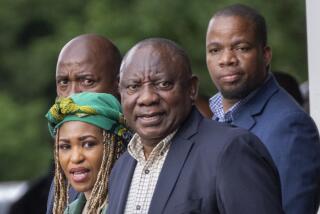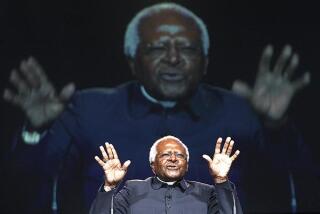Noted Apartheid Foe Sentenced for Stealing Aid
- Share via
JOHANNESBURG, South Africa — Allan Boesak, a fiery and sometimes flamboyant preacher who was at the forefront of the struggle against white rule, must spend three years in jail for stealing charitable donations from singer Paul Simon and other anti-apartheid supporters, an appeals court ruled Friday.
The decision brings to a close an emotional and embarrassing saga for Boesak and the ruling African National Congress, which earlier cleared the former provincial party leader of wrongdoing during an internal investigation.
Boesak will be the most prominent ANC official and anti-apartheid activist to serve a jail term since the beginning of black-majority rule in 1994. His case has been a lightning rod for the ANC’s critics, who say the organization went too far in defending the disgraced former cleric because of his prominence in fighting the system of racial separation.
“The whole nation is watching this case to see if government interference will have made a difference,” said Rhoda Kadalie, who, like Boesak, was active in the anti-apartheid United Democratic Front in the 1980s and later joined the ANC. “I am very glad the judiciary asserted its independence. I feel sorry for Allan Boesak because he was a talented theologian and politician, but he played it wrong.”
Boesak was convicted last year on four counts of fraud and theft involving contributions administered by his now-defunct Foundation for Peace and Justice. The donations, including $350,000 from Simon in 1988, were meant for victims of apartheid, especially impoverished children.
But prosecutors proved that Boesak had pocketed some of the gifts, including $133,000 raised during Simon’s Graceland tour of South Africa. Boesak’s accountant, Freddie Steenkamp, pleaded guilty to related charges and testified against his former employer, though he later admitted to making up much of his testimony.
The lower court sentenced Boesak to six years in prison in March 1999, but he remained free on bail pending the appeal. In its ruling Friday, the Supreme Court of Appeal in Bloemfontein cut the sentence in half after siding with Boesak’s lawyers on one count involving donations from a Swedish aid agency. In a unanimous decision, the court said there was no doubt of Boesak’s guilt in the other instances.
Throughout it all, Boesak has admitted only to sloppy bookkeeping. He also has said some of the donated money was meant as personal gifts for him.
“He is very distressed and very disappointed,” said Chris Petty, his attorney. “He said to me that he maintains his innocence, as he has from the day this started.”
Mary Burton, a respected foe of apartheid and a witness against Boesak, headed the Children’s Trust, which received donations from Simon and other foreign contributors in the 1980s. Burton said she was saddened by Friday’s ruling but added she had no doubt that “some things were done [by Boesak] that were wrong.”
She said Boesak was not the only anti-apartheid activist who abused his position. That made his conviction seem unfair to his admirers, she added, but should not exonerate him.
“For this to happen, others had to be involved, and we will never know who took what decisions,” Burton said. “But whatever happened, if Allan had been able to say, ‘I take responsibility because the money disappeared when it was in my care,’ it might not have helped legally, but ethically it would have done a great deal.”
Top ANC officials, including former President Nelson Mandela, have stood resolutely by Boesak. They have suggested that any misuse of donations was unintentional and pales in significance when measured against Boesak’s role in the struggle against white-minority rule. South Africa’s most famous religious leader, retired Anglican Archbishop Desmond M. Tutu, also has argued that Boesak does not deserve to be jailed.
Boesak was a founder of the United Democratic Front and was arrested in 1985 for organizing a march on Pollsmoor Prison, where Mandela was being detained after a long imprisonment on Robben Island. A minister with the Dutch Reformed Mission Church, Boesak was an electrifying speaker and often was compared to Martin Luther King Jr.
Mandela tempered his praise of Boesak during the fraud trial because of complaints that he could compromise the independence of the courts. Mandela, who was president at the time, nonetheless went on to raise funds for his friend’s legal defense. He also once considered Boesak for an ambassadorial post.
“The law has taken its course, and it is something that we will have to live with,” ANC spokeswoman Nomfanelo Kota-Mayosi said. “But there is no reason to rejoice. At this point in time in our democracy, which is quite new, we need men and women of his stature to assist in the reconstruction of the country . . . not spend three years behind bars.”
South African law will allow Boesak to apply for parole well before the end of his sentence. Kota-Mayosi said the ANC expects that Boesak “will come back and be rehabilitated into society,” possibly regaining his stature within the ANC.
Such speculation sounds farfetched to some, but Boesak already has managed to reinvent himself once before. In 1990, he resigned as head of the World Alliance of Reformed Churches and as leader of the Dutch Reformed Mission Church after publicity surrounding an extramarital affair with a white woman.
Pundits said his career was dead, but Boesak, who is of mixed race, married the woman, Elna Botha, and went on to assume the provincial leadership post in the ANC.
“Allan is an irrepressible, unstoppable person,” said Kadalie, the former United Democratic Front activist. “His self-esteem is extremely high. I think when people refuse to believe that they are fallible, they will come back.”
More to Read
Sign up for Essential California
The most important California stories and recommendations in your inbox every morning.
You may occasionally receive promotional content from the Los Angeles Times.












